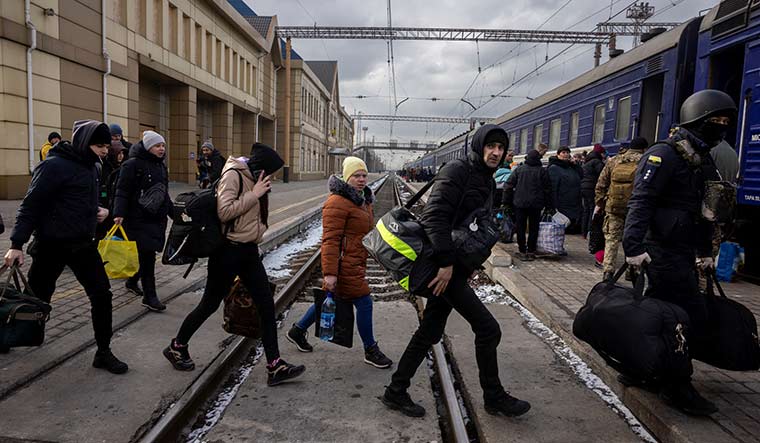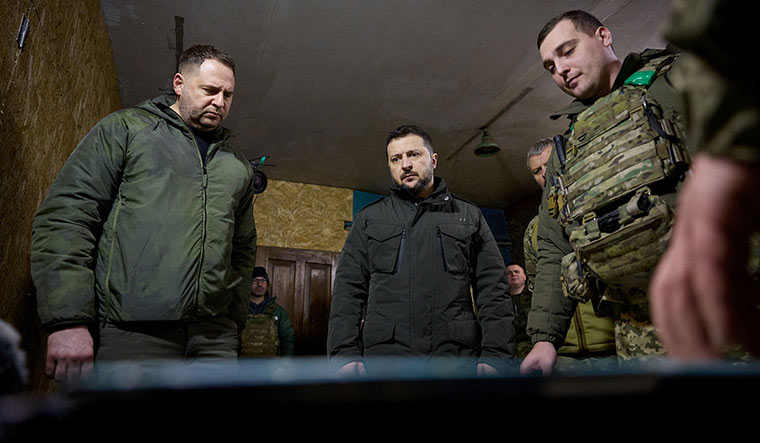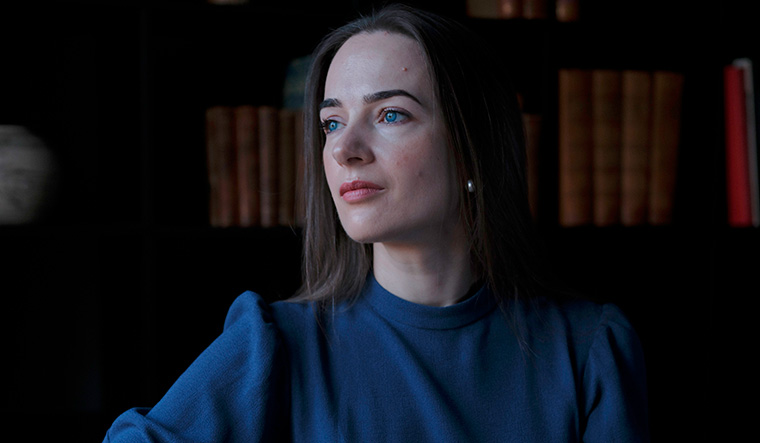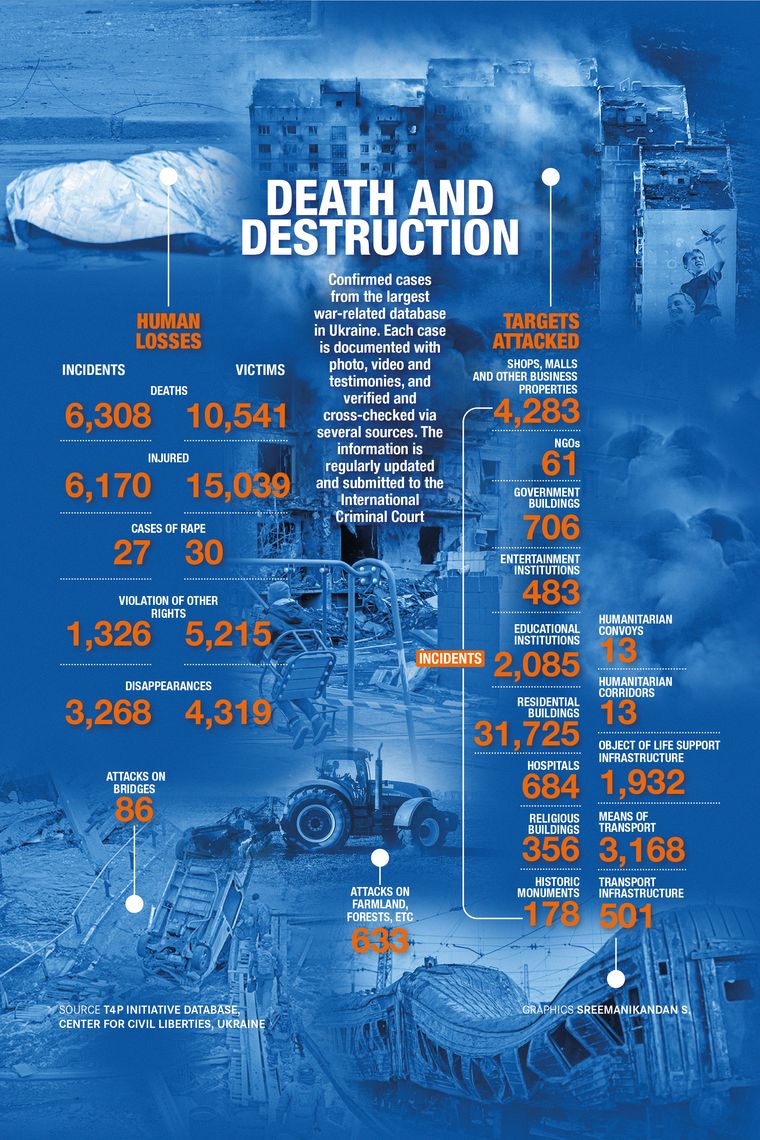We agreed to meet in front of the statue of Mahatma Gandhi in the Botanical Gardens near the main red-coloured building of the Taras Shevchenko National University in Kyiv. This Gandhi statue was the only one in the world to have been installed in 2020, celebrating the Mahatma’s 150th birth anniversary which fell on October 2, 2019, in spite of the pandemic. Reaching the statue, we both pay our homage. Here I stand with Ukraine’s human rights champion Oleksandra Matviichuk, as the organisation she leads, the Centre for Civil Liberties (CCL), was awarded the Nobel Peace Prize in 2022, some months after Russia attacked Ukraine. With Gandhi as our sole witness, we discuss human rights in Ukraine in the small corner of the botanical garden called the ‘Oasis of Peace’.
Having known Oleksandra for more than a decade, I was always impressed by her gentle, graceful manner yet steely resolve and unwavering commitment, which got stronger with all that she had gone through. She reflects how she, as a schoolchild, was enchanted with the ideas of Gandhi and admired such personalities as Vaclav Havel and Nelson Mandela. During the past decade, a whole generation of young human rights defenders has emerged in Ukraine, inspired by their predecessors.
The predecessors fought under harsher conditions: incarceration in gulags, Stalinist and post-Stalinist totalitarian repression. They often had to give up everything―jobs, wealth, family and, ultimately, their lives. Oleksandra fondly recalls her mentor, Yevhen Sverstyuk, the great dissident, who, like most dissidents and political prisoners in the former USSR, was a staunch admirer of Gandhi. I could see the influence of Sverstyuk: his wisdom, balance and decency, matched with iron will and strength of mind that bore all torture. During her higher studies, Oleksandra was drawn to dissident circles and the human rights organisation for writers PEN-Ukraine. Soon after the completion of her studies, she joined the newly formed CCL in 2007.
The war changed her regular work mode to urgent and acute. A lawyer with a human rights background and a heart full of empathy, she said, “During these turbulent times, you really see the best qualities emerge in each person. Facing the horrors of death and destruction, people reflect on what is it to be human. Your priorities change, your perception of the world, too. I do not think war made us worse and coarse. It made us steadfast and brave. It enlightened us to know our place in the world.”
But, the war in Ukraine is not only important for Ukrainians, its impact is felt on the whole world, on other human rights defenders as well. Shouldn’t there be solidarity among the human rights defenders? “It is a test for the world. Human rights is the same for the whole world. What Russia wants to prove as a permanent member of the UN Security Council is that freedom is a fake value. It is not worth fighting for it,” said Oleksandra. “But if the world does not deter Russia’s aggression, conflicts will increase. Use of force to achieve anything a leader of any country wants will become easy. There will be nuclear proliferation, and we will see more ecocide, destroying of natural environment and human habitat, like the one we had near Kherson, the Kakhovka dam. So many humans and animals perished. Values nurtured by the ideas of liberty, equality and fraternity will be eroded.”
 Struggle for survival: People board an evacuation train at Pokrovsk after Russia captured the crucial city of Avdiivka | REUTERS
Struggle for survival: People board an evacuation train at Pokrovsk after Russia captured the crucial city of Avdiivka | REUTERS
To bring back faith in humanity and justice, the aggressor should be punished. Oleksandra started a global initiative: T4P, Tribunal for Putin. Trustees of this initiative are the CCL, the Kharkiv Human Rights Protection Group and the Ukrainian Helsinki Human Rights Union. Convinced that the evil currently being perpetrated by Russia in Ukraine is a result of the failure to condemn the evil done in the past, the initiative includes 24 organisations from all over Ukraine. They document and collect evidences that display features of crimes defined in the Rome Statute of the International Criminal Court as genocide, crimes against humanity and war crimes. The focus is on the restoration of justice by holding the perpetrator liable.
Many of my western friends were skeptical about this. Their skepticism was grounded on the long time it takes, the cumbersome procedures and the problem of establishing the crime under particular articles of war crimes and crimes against humanity of The Hague and the Geneva Conventions. It looks unrealistic. Oleksandra gently remarked, “Yes, unrealistic, and perhaps, even fantastic, if we go by the 19th century standards. But civilisation is moving forward. Today we have the international legal framework. Remember: Nuremberg did happen, so did the tribunals with regard to former Yugoslavia, Rwanda, Cambodia and the like. My colleagues in the All-Ukrainian Network of Human Rights organisations have collected thousands of cases, enormous amount of data, testimonies of people, video and other documentation of war crimes and crimes against humanity. If the perpetrators are held and tried, a new hope is infused in humans. How to allow the perpetrators to get away with all this impunity?”
As of February 18, 2024, the total number of cases of documented war crimes in Ukraine were close to 64,460. I asked her about the period these data were collected. She cautioned, “The data are increasing day by day. People saw the massacres in Bucha and Irpin near Kyiv. There are so many Buchas all over the occupied territories. Think of the almost 19,000 children stolen and sent to Russia, and these are confirmed cases. And the thousands of adults forcibly deported to Russia, today almost 7,000 by the humblest estimates. We are fighting hard to get them back. With the prisoners of war there are periodic exchanges. But for the civilians the work is harder. They are not covered by international conventions. But, the world cannot afford to be indifferent. Perhaps, India can use its authority to get our civilians and children back from Russia.”
 Against all oddS: President Volodymyr Zelensky (centre) at a frontline position near Kupiansk in Kharkiv | REUTERS
Against all oddS: President Volodymyr Zelensky (centre) at a frontline position near Kupiansk in Kharkiv | REUTERS
The human rights record was far from being perfect in this part of the world. No one could imagine that the methods used in the 1920s and 1930s will come back now. The situation is terrible now, with the Ukrainian government registering more than 1.2 lakh criminal cases related to the war within its own judicial system.
There is a debate within Ukraine about the ratification of the Rome Statute. Signed by Ukraine on January 20, 2000, its ratification was hindered by an opinion of the constitutional court of Ukraine in 2001 that the statute was inconsistent with the constitution of Ukraine. An amendment to Article 124 of the constitution of Ukraine in 2019 enabled Ukraine to recognise the jurisdiction of the International Criminal Court (ICC) on the principles of the Rome Statute. In 2014 and 2015, Ukraine made declarations about ad hoc recognition of the ICC jurisdiction, authorising it to prosecute and punish crimes against participants of the Revolution of Dignity and international crimes committed during Russia’s aggression against Ukraine. Today, ratification of the Rome Statute is Ukraine’s international obligation contained in Article 8 of the EU-Ukraine Association agreement. Although some politicians in Ukraine are reluctant on this issue, the CCL and the human rights community actively propose ratification. As a full-fledged member, Ukraine will not only have obligations, as now, but can then decide on procedural, budgetary and other ICC issues, elect judges, propose amendments to the Rome Statute.
Our conversation slowly turned and touched upon Russia, which, too, signed the Rome Statute in 2000, but did not ratify. I was curious to know what does she think of the handful of Russians who sympathise with Ukraine. Does she have any dialogue? Surprisingly, she was positive about them, and said, “We have no hatred towards those Russians. We just do not want our country to be a mirror of Russia. Russia should become democratic. That is a long way off, considering the system they have and the oppressed people in various units of the federation, especially non-ethnic Russians, the Buryat, Kalmyk, Bashkir, Karakalpak, Mari, Karelian, Mansi, Nanai and hundreds of other nationalities. For ages, they faced the cynical policy of total assimilation. They should be empowered. But that is the internal work of Russians.”
Discussing the problem of Russian opposition, Oleksandra said, “With Alexei Navalny, Putin’s political rival in the coming elections, dying in jail on February 16, there is another addition to the long list of opposition leaders and opinion makers such as Boris Nemtsov, Anna Politkovskaya and Sergei Magnitsky who were targeted and removed. Russia’s appalling human rights situation is known to all, politicians and world leaders frequently comment, but anyhow, they try to ‘keep the door open’ to negotiate with the Kremlin.”
I added that there still are human rights defenders in Russia and Belarus. Suffice it to recall, the CCL shared the 2022 Nobel Peace Prize with the Russian organisation Memorial and Ales Bialiatski, the human rights activist from Belarus. The bitter truth is that among the almost 1,500 political prisoners held in Belarus, Bialiatski was held for a long time without trial after participating in protests in 2021. He was sentenced to 10 years of imprisonment in March 2023. According to Viasna, an organisation founded by Bialiatski in 1996, the conditions in prison can be described as torture, because the accused are held for several months in a 19th century building, in its poorly lit cells with no fresh air, no sunlight, minimal food and little or no health care.
Memorial was set up in 1989, headed by the world famous physicist Andrei Sakharov, who was awarded the Nobel Peace Prize in 1975. The group had the best database of Stalinist crimes and the Soviet period oppression and contributed significantly to the memory and history of Russia’s recent past. But its successes were short-lived. After years of intimidation, seizure of archives (in 2008), incessant persecution and legal obstacles, the highly reputed organisation was shut down by a Russian court in December 2021. Alexander Cherkasov, the present chair of the Memorial, is in exile in Paris.
Is that the reason why no one speaks of defending rights in Russia? I remembered, recently, Nepalese authorities complained that 15,000 of their nationals were recruited by Russia as soldiers to fight in Ukraine. The issue came to light after some of them, who were held as prisoners of war by Ukraine, gave testimony about how they were promised money and were recruited. A few days ago, the world came to know about the death of one Indian on the war front and the presence of nearly 100 more, recruited by India-based agents under false promises of work. On February 25, soldiers of African origin in the Russian army were seen in the occupied parts of the Kherson region. I asked Oleksandra if she had any remedy to these issues. She said, “From the very beginning, in 2014 in Crimea, then after February 24, 2022, Russia systematically sends its own indigenous peoples, living in Buryatia, Yakutia, Tatarstan, Dagestan to die in the war in Ukraine. Russia also illegally recruits nationals of other countries, using their difficult socioeconomic situation. These people are used as cannon fodder in Ukraine, behind them are the better trained and armed servicemen of the Russian regular army. We have to document, act and protest. That is the only way for us, the civil society. I am very sorry about the plight and the loss of lives of any foreign citizen, including of India and Nepal.”
We both sigh deeply, thinking of the future. To my question on the post-war reconstruction, Oleksandra reflected, “I know reconstruction means money and resources. A lot of money also brings a lot of problems, problems of management and use of resources. First of all, the focus of reconstruction should be people. We should have a people-centred reconstruction. We have had enough of the haphazard and chaotic transition and developments of the 1990s, giving rise to many problems related to the unequal distribution of wealth in our society. The human rights framework should be maintained. Only then we can have full victory. We should have some kind of a manifesto of the civil society.”
The war is in a critical stage. Ukraine faces many challenges, including those of arms and ammunition and support―both financial and moral. What is the way out? I asked. Her response was short and straight: “If you build your decisions based only on geopolitics and economic benefit, you will ultimately lose. Many countries closed their eyes on the problems of armed intervention and frozen conflicts created by Russia, such as Chechnya, the Transnistria in Moldova, the annexation of Abkhazia and South Ossetia which are parts of Georgia, then occupation of Crimea and the proxy war in Donbas. They conducted business as usual with Russia. This nurtured and armed Putin’s regime. And the world is facing its consequences. Leaders of the world look for electoral benefits, but they should think of the long-term interests of their own people and their responsibility before the world.”
Before I could ask her about February 24, 2022, which many in the world think as the day Russian aggression started, she rightly added, “And we have to recall, the war did not start two years ago. It started in February 2014 with the occupation of Crimea using “polite green men without insignia” and the launching of proxy warlords with active help of the Russian army in Donbas. So we are entering the 11th year, after completing a decade of war.”
Turning towards the Gandhi statue, Oleksandra said, “You know, I think of Gandhi as an amazing personality. The Mahatma’s ideas are forever with us! What would Gandhi have said or done today had he been alive? Definitely, he would stand with Ukraine.”
After attending the Republic Day reception hosted by the Indian embassy in Kyiv on January 26 this year, Oleksandra wrote on X: “Recalling the well-known words of Mahatma Gandhi, which have inspired me since childhood: ‘Strength does not come from physical capacity. It comes from an indomitable will.’ I would like to add that India and Ukraine, though geographically distant, are close in common democratic values and the aspiration to build a strong and secure world for our children. Otherwise, they will have to do it themselves.”
As we walked back the streets of Kyiv, these words of Oleksandra rang in my ears. I also recalled a few lines from her Nobel acceptance speech, titled “Time to take responsibility”: “We must stop pretending deferred military threats are ‘political compromises’. The democratic world has grown accustomed to making concessions to dictatorships. And that is why the willingness of the Ukrainian people to resist Russian imperialism is so important. We will not leave people in the occupied territories to be killed and tortured. People’s lives cannot be a ‘political compromise’. Fighting for peace does not mean yielding to pressure of the aggressor, it means protecting people from its cruelty…. You don’t have to be Ukrainians to support Ukraine. It is enough just to be humans.”



